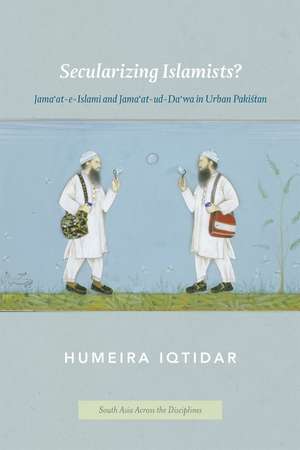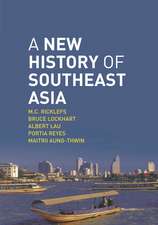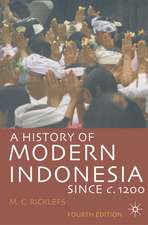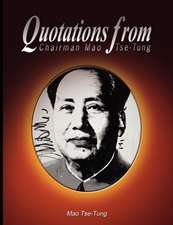Secularizing Islamists?: Jama'at-e-Islami and Jama'at-ud-Da'wa in Urban Pakistan: South Asia Across the Disciplines
Autor Humeira Iqtidaren Limba Engleză Paperback – 3 mar 2014
This book offers a fine-grained account of the workings of both parties that challenges received ideas about the relationship between the ideology of secularism and the processes of secularization. Iqtidar particularly illuminates the impact of women on Pakistani Islamism, while arguing that these Islamist groups are inadvertently supporting secularization by forcing a critical engagement with the place of religion in public and private life. She highlights the role that competition among Islamists and the focus on the state as the center of their activity plays in assisting secularization. The result is a significant contribution to our understanding of emerging trends in Muslim politics.
Din seria South Asia Across the Disciplines
-
 Preț: 224.82 lei
Preț: 224.82 lei -
 Preț: 188.21 lei
Preț: 188.21 lei -
 Preț: 251.31 lei
Preț: 251.31 lei -
 Preț: 277.16 lei
Preț: 277.16 lei -
 Preț: 278.09 lei
Preț: 278.09 lei - 23%
 Preț: 515.90 lei
Preț: 515.90 lei -
 Preț: 252.50 lei
Preț: 252.50 lei -
 Preț: 298.67 lei
Preț: 298.67 lei -
 Preț: 276.57 lei
Preț: 276.57 lei -
 Preț: 466.27 lei
Preț: 466.27 lei -
 Preț: 543.92 lei
Preț: 543.92 lei -
 Preț: 282.32 lei
Preț: 282.32 lei -
 Preț: 274.66 lei
Preț: 274.66 lei -
 Preț: 272.54 lei
Preț: 272.54 lei -
 Preț: 278.09 lei
Preț: 278.09 lei -
 Preț: 314.03 lei
Preț: 314.03 lei -
 Preț: 267.26 lei
Preț: 267.26 lei -
 Preț: 272.54 lei
Preț: 272.54 lei - 23%
 Preț: 480.07 lei
Preț: 480.07 lei -
 Preț: 230.67 lei
Preț: 230.67 lei -
 Preț: 314.03 lei
Preț: 314.03 lei -
 Preț: 255.38 lei
Preț: 255.38 lei -
 Preț: 272.32 lei
Preț: 272.32 lei -
 Preț: 255.18 lei
Preț: 255.18 lei -
 Preț: 269.17 lei
Preț: 269.17 lei -
 Preț: 313.45 lei
Preț: 313.45 lei -
 Preț: 286.81 lei
Preț: 286.81 lei -
 Preț: 507.95 lei
Preț: 507.95 lei -
 Preț: 251.53 lei
Preț: 251.53 lei - 23%
 Preț: 447.94 lei
Preț: 447.94 lei - 14%
 Preț: 457.16 lei
Preț: 457.16 lei - 19%
 Preț: 161.18 lei
Preț: 161.18 lei - 16%
 Preț: 547.59 lei
Preț: 547.59 lei - 19%
 Preț: 148.93 lei
Preț: 148.93 lei - 17%
 Preț: 153.36 lei
Preț: 153.36 lei - 14%
 Preț: 355.26 lei
Preț: 355.26 lei - 17%
 Preț: 335.27 lei
Preț: 335.27 lei - 22%
 Preț: 480.63 lei
Preț: 480.63 lei
Preț: 249.62 lei
Nou
Puncte Express: 374
Preț estimativ în valută:
47.77€ • 49.35$ • 39.76£
47.77€ • 49.35$ • 39.76£
Carte tipărită la comandă
Livrare economică 25 martie-08 aprilie
Preluare comenzi: 021 569.72.76
Specificații
ISBN-13: 9780226141732
ISBN-10: 022614173X
Pagini: 232
Dimensiuni: 152 x 229 x 18 mm
Greutate: 0.32 kg
Editura: University of Chicago Press
Colecția University of Chicago Press
Seria South Asia Across the Disciplines
ISBN-10: 022614173X
Pagini: 232
Dimensiuni: 152 x 229 x 18 mm
Greutate: 0.32 kg
Editura: University of Chicago Press
Colecția University of Chicago Press
Seria South Asia Across the Disciplines
Notă biografică
Humeira Iqtidar is a lecturer in politics in the Department of Political Economy at King’s College London.
Cuprins
List of Abbreviations
Preface and Acknowledgments
Introduction
Secularism in Pakistan
A Failed Experiment?
One Colonial Secularism and Islamism in North India
A Relationship of Creativity?
Two Jama‘at-e-Islami Pakistan
Learning from the Opposition
Three Competition among Allies
JD and JI in Urban Lahore
Four Harbingers of Change?
Women in Islamist Parties
Women in Islamist Parties
Conclusion
Islamists
Secularizing and Liberal?
References
Index
Recenzii
“Based on rich ethnography and written with historical and theoretical imagination, this riveting book offers a timely and subtle contribution to our understanding of the place and impact of religion in public life. Humeira Iqtidar’s resonant accounts of the origins, diversity, and role of gender in Pakistan’s Islamist movements, and her deep insight that secularization can be underpinned by social forces that combat secularism, force a reconsideration of long-held concepts and convictions about politics and belief.”
“The real strength of Secularizing Islamists? is the depth of its empirical research, both historical and anthropological—there is no other work that brings such a range of materials to a study of Islamism in contemporary Pakistan. Here, Humeira Iqtidar offers a compelling historical argument that demonstrates how Islamist movements in Pakistan have long relied upon processes of social and political secularization. This important book will have a wide readership across the social sciences and humanities and will be of interest to students of South Asian history and culture, the history of secularism, modern and contemporary Islamic studies, as well as policy professionals worldwide who are concerned with Islamic radicalism.”
“At the heart of this book is an incongruous question: what would happen if we analyzed Islamists (who define themselves in almost polar opposition to ‘secularism’) as products of a process of ‘secularization’? What happens is not a definitive new interpretation of Islamism, but rather the suggestion of a range of new questions and perspectives for looking at Islamist thinking in its political and everyday contexts. Broad, original, and interdisciplinary, this book will find an important audience among a large number of scholars who have long struggled to make sense of the Islamist phenomenon.”
“Iqtidar has fashioned a short but important examination of not only Islamist but religious practice in the modern world.”














